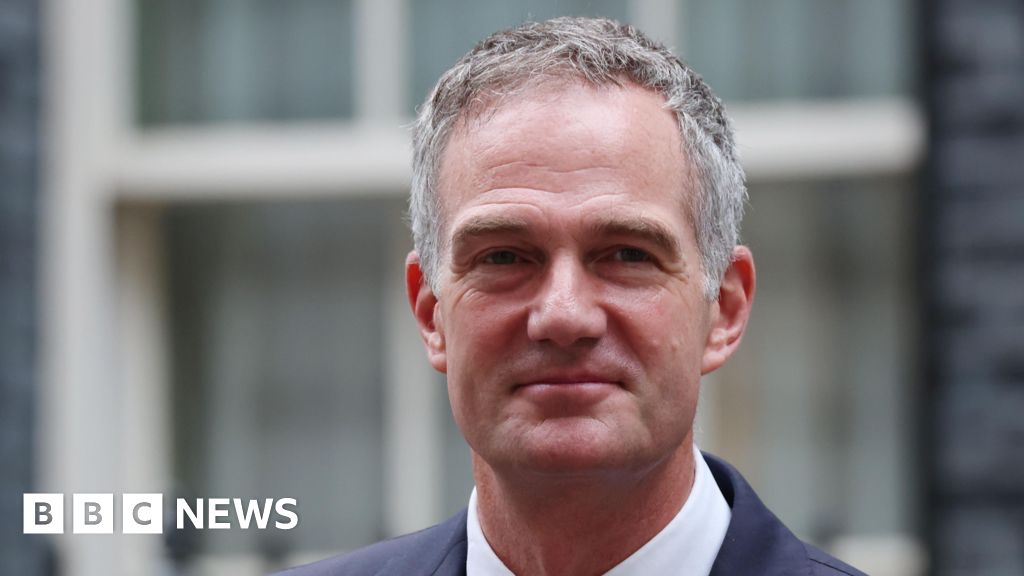Science and Know-how Secretary Peter Kyle has written to the UK’s nationwide institute for synthetic intelligence (AI) to inform its bosses to refocus on defence and safety.
In a letter, Kyle mentioned boosting the UK’s AI capabilities was “crucial” to nationwide safety and ought to be on the core of the Alan Turing Institute’s actions.
Kyle urged the institute ought to overhaul its management crew to mirror its “renewed function”.
The cupboard minister mentioned additional authorities funding within the institute would depend upon the “supply of the imaginative and prescient” he had outlined within the letter.
A spokesperson for the Alan Turing Institute mentioned it welcomed “the popularity of our crucial position and can proceed to work carefully with the federal government to help its priorities”.
“The Turing is focussing on high-impact missions that help the UK’s sovereign AI capabilities, together with in defence and nationwide safety,” the spokesperson mentioned.
“We share the federal government’s imaginative and prescient of AI remodeling the UK for the higher.”
The letter comes after Prime Minister Sir Keir Starmer dedicated to a Nato alliance goal of accelerating UK defence spending to five% of nationwide revenue by 2035 and make investments extra in army makes use of of AI expertise.
A current authorities evaluate of UK defence mentioned “a direct precedence for pressure transformation ought to be a shift in direction of higher use of autonomy and synthetic intelligence”.
Arrange beneath Prime Minister David Cameron’s authorities because the Nationwide Institute for Information Science in 2015, the institute added AI to its remit two years later.
It receives public funding and was given a grant of £100m by the earlier Conservative authorities final yr.
The Turing institute’s work has centered on AI and knowledge science analysis in three primary areas – environmental sustainability, well being and nationwide safety.
Recently, the institute has centered extra on accountable AI and ethics, and one among its current reviews was on the rising use of the tech by romance scammers.
However Kyle’s letter suggests the federal government needs the Turing institute to make defence its primary precedence, which might be a big pivot for the organisation.
“There is a chance for the ATI to grab this second,” Kyle wrote within the letter to the institute’s chairman, Dr Douglas Gurr.
“I consider the institute ought to construct on its present strengths, and reform itself additional to prioritise its defence, nationwide safety and sovereign capabilities.”
It has been a turbulent few months for the institute, which finds itself in survival mode in 2025.
A evaluate final yr by UK Analysis and Innovation, the federal government funding physique, discovered “a transparent want for the governance and management construction of the Institute to evolve”.
On the finish of 2024, 93 members of employees signed a letter expressing insecurity in its management crew.
In March, Jean Innes, who was appointed chief govt in July 2023, mentioned the Turing wanted to modernise and concentrate on AI initiatives, in an interview with the Monetary Occasions.
She mentioned “an enormous strategic shift to a way more centered agenda on a small variety of issues that have an effect in the actual world”.
In April, Chief Scientist Mark Girolami mentioned in an interview the organisation can be taking ahead simply 22 initiatives out of a portfolio of 104.
Kyle’s letter mentioned the institute “ought to proceed to obtain the funding wanted to implement reforms and ship Turing 2.0”.
However he mentioned there might be a evaluate of the ATI’s “longer-term funding association” subsequent yr.
Using AI in defence is as highly effective as it’s controversial.
Google’s dad or mum firm Alphabet confronted criticism earlier this yr for eradicating a self-imposed ban on creating AI weapons.
In the meantime, the British army and different forces are already investing in AI-enabled instruments.
The federal government’s defence evaluate mentioned AI applied sciences “would supply higher accuracy, lethality, and cheaper capabilities”.
The evaluate mentioned “uncrewed and autonomous techniques” might be used throughout the UK’s typical forces throughout the subsequent 5 years.
In a single instance, the evaluate mentioned the Royal Navy might use “acoustic detection techniques powered by synthetic intelligence” to observe the “rising underwater menace from a modernising Russian submarine pressure”.
The Nato spending goal the UK has dedicated to entails spending a minimum of 3.5% on core defence, and as much as 1.5% on security-related investments.
Requested whether or not any authorities funding that goes to the Alan Turing Institute would now rely in direction of the defence spending goal, Downing Avenue mentioned the 1.5% safety component would come with “investments that increase the general resilience of our society”.
The tech agency Palantir has supplied knowledge operations software program to the UK’s armed forces.
Louis Mosley, the pinnacle of Palantir UK, advised the BBC that shift the institute’s focus to AI defence applied sciences was a good suggestion.
He mentioned: “Proper now we face a frightening mixture of darkening geopolitics and technological revolution – with the world turning into a extra harmful place proper in the meanwhile when synthetic intelligence is altering the face of battle and deterrence.
“What which means in follow is that we at the moment are in an AI arms race towards our adversaries.
“And the federal government is true that we have to put all of the assets we have now into staying forward – as a result of that’s our greatest path to preserving peace.”
Extra reporting by Chris Vallance, senior expertise reporter



